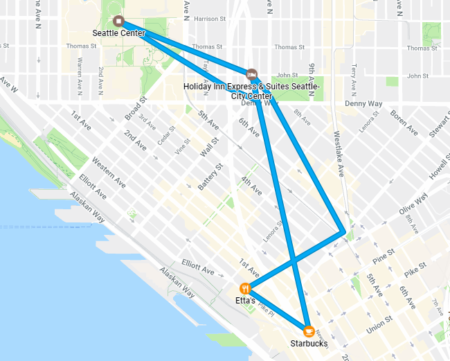July 4, 2019 – Happy Fourth of July to my American subscribers and readers. The nation that gave birth to the modern concept of a federal democracy has been tested over the last 30 months and it will be interesting to see how well it manages as it goes into the next federal election cycle.
The United States and its form of government have encouraged the incubation of much of today’s global Internet-based economy. Smartphones were invented here first before Japanese, Korean, and Chinese companies copied and then improved on existing models. And the algorithms of Google opened the world to collective learning in a way never thought possible a mere few decades before its invention. And now Google algorithms, combined with the global positioning satellite (GPS) system invented by the United States military research arm, DARPA, is showing me over the last two weeks just how far-reaching this technology has become as my wife and I traveled from Santa Cruz, California up the Pacific coast to Vancouver.
Our vacation began with a flight to Santa Cruz, California where we attended a wedding. We then traveled north along the Pacific highway spending two days in San Francisco, another two days traversing Northen California, then two days In Oregon, two days in Seattle, and finally two days in Vancouver before flying home. While we were doing this Google tracked every move we made with its Maps and Timeline application plotting our daily activity and rendering it on a map, not only where we were staying, but where we went and when.
In our two days in Seattle, it traced our travels to the Space Needle and its surrounding park, to our journey to Pike’s Fish Market, and the restaurant where we ate (see image below).
As much as I am a great admirer of the technology that can do this, I don’t remember at any time opting in to let Google follow my every move. That’s what made it so creepy. But it seems that when I set up my phone with GPS tracking switched on I was allowing Maps to follow me from location to location. And even though I had not given Google permission to provide location sharing with others, a feature of the application, it appeared that Google was faithfully collecting my location data and storing it in some database somewhere.
I soon noticed another change in my smartphone photo library. I use a 5-year old Nexus Android smartphone. It still works beautifully and features a superb camera which I use to take more pictures than with my Sony digital camera. The Photos app has always organized my pictures by date. But on this California trip it was selecting the best images from the phone on any given day and featuring them in the library. And Maps was asking me to tag and share these photos with a larger Google audience.
I am not sure when Google apps become too much. But I am beginning to feel that way.
I have always enjoyed the fact that because I follow Major League Baseball, my Nexus smartphone, without asking me, has provided links on my start screen to last evening’s ball scores for my favourite teams.
I’ve thought, “wow, the machine is learning my personal habits. How cool!” I have no problem with this type of artificial intelligence (AI). Nor do I have a problem with the news feed that reflects my Google searches. I am happy to have a little AI helper like this feeding me content that reflects my interests.
But the Maps and Timeline feature started creeping me out. So I went online to see if others felt similarly. And this is what I found.
In an article appearing in the New York Times back on December 10th, 2018, authors Jennifer Valentino-DeVries, Natasha Singer, Michael Keller, and Aaron Krolick, described how smartphones have begun to snoop on “people’s daily habits.” The authors write that the wanderings of each of us with an Android smartphone could provide “precise location data” and give companies tracking data access to your daily behaviour.
So even though you might not give Google Maps the right to location share with others, the data of your travels is being fully documented, “accurate to within a few yards,” and updated “more than 14,000 times a day.” This location harvesting Google shares with corporate subscribers to its database services, and companies use the information for location-targeted advertising worth “an estimated $21 billion” in 2018.
Google has always claimed there is anonymity in the massive amounts of data it collects through its Search and Maps applications. It tells you that you are not identified by a unique ID, by a phone number, or by name. But that doesn’t mean the Google feature isn’t intrusive. For example, right now my Google smartphone is sitting on my desk beside my computer. If I open Google Maps it shows me at my address as a red highlighted dot. And when I walked my dog an hour ago, Google knew every one of my footsteps because my smartphone was in my pocket.
If this isn’t unnerving enough, the following is where it can really get creepy.
What if someone in one of the companies buying Google data services recognizes your address, and isolates your activity? Google may say they have anonymized the data, but it cannot stop a subscriber from figuring out who you are by where you live, and by the activities you do each day.
And the privacy policy that Google adheres to makes no guarantee that the location information its Maps application harvests about you cannot end up in the hands of someone with evil intent.
We speak of China creating a surveillance society where every citizen’s actions are tracked and noted. It seems, however, that the tools to achieve this have been created by a company birthed in the American democracy that values the freedom of each individual, and the right to privacy. Maybe on this Fourth of July, Americans and the rest of us who have bought into the world of Google and its apps universe should take a closer look at how our liberal democracies are becoming more Orwellian than we ever could have imagined.
















